30+ Sample Goal Setting Worksheet
-
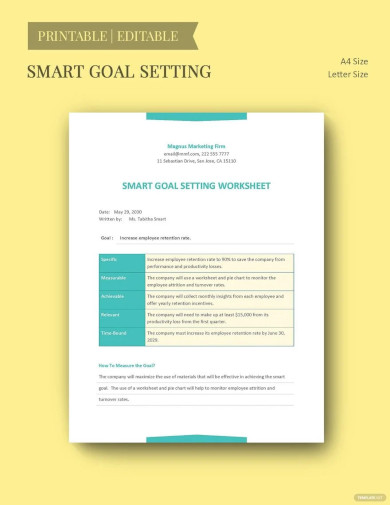
Smart Goal Setting Worksheet Template
download now -

Smart Goal Setting Worksheet For Entrepreneurs
download now -

Goal Setting Worksheet Template
download now -
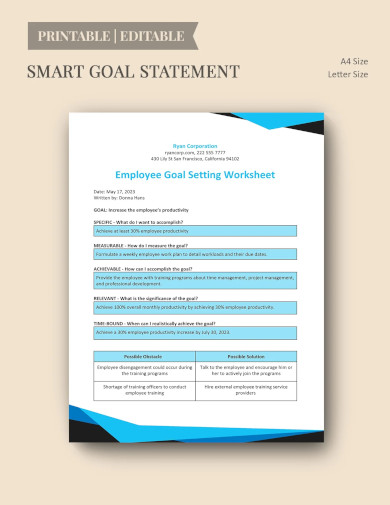
Employee Goal Setting Worksheet Template
download now -

Real Estate Goal Setting Worksheet Template
download now -

Printable Goal Setting Form Template
download now -
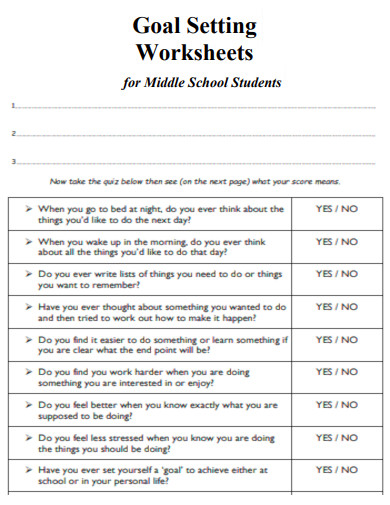
Goal Setting Worksheet for Middle School
download now -
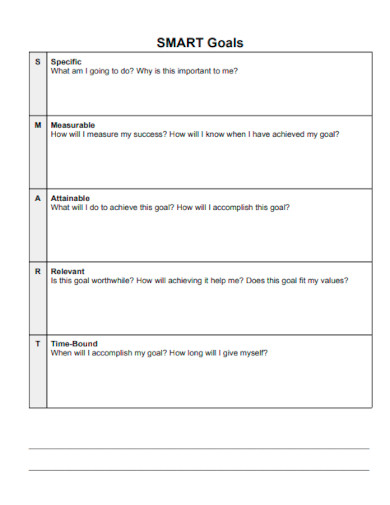
Goal Setting Worksheet in PDF
download now -

High School Goal Setting Worksheet
download now -

Elementary Academic Goal Worksheet
download now -
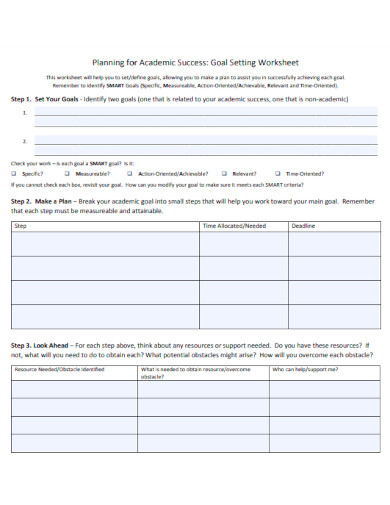
Academic Success Goal Setting Worksheet
download now -
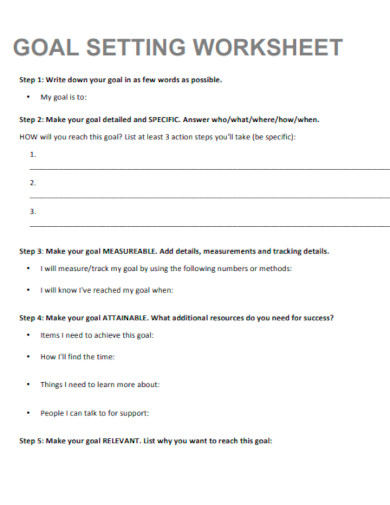
Goal Setting Worksheet Answer
download now -
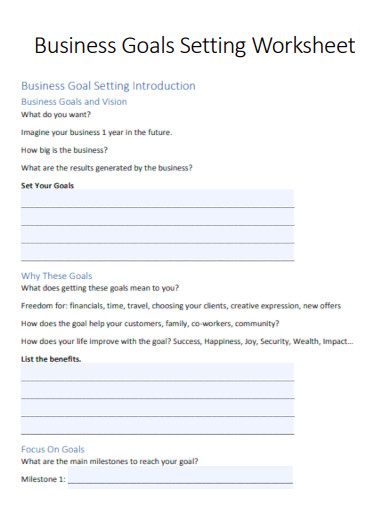
Business Goal Setting Worksheet
download now -
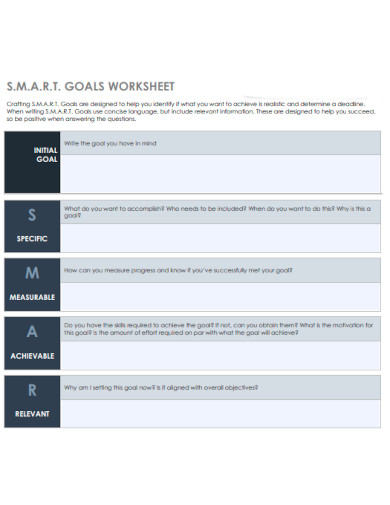
Interactive Goal Setting Worksheet
download now -
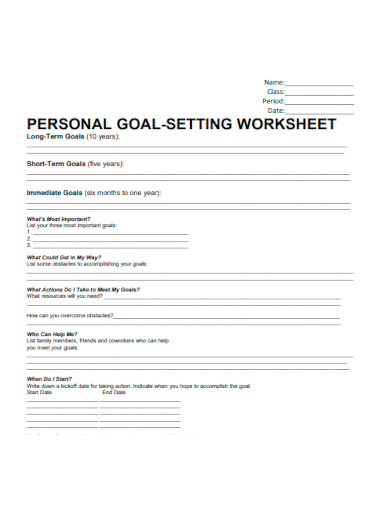
Personal Goal Setting Worksheet
download now -
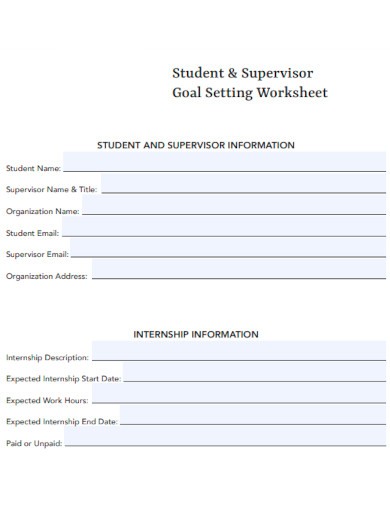
Students Goal Setting Worksheet
download now -

Children Goal Setting Worksheet
download now -
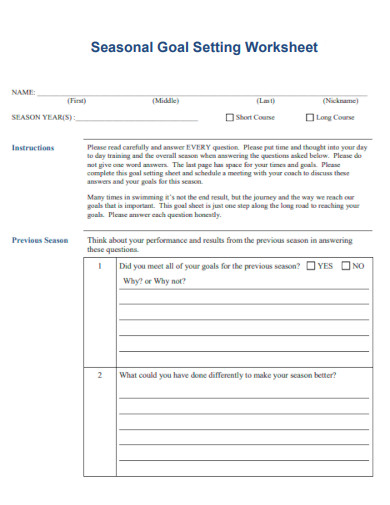
Seasonal Goal Setting Worksheet
download now -

Agriculture Goal Setting Worksheet
download now -
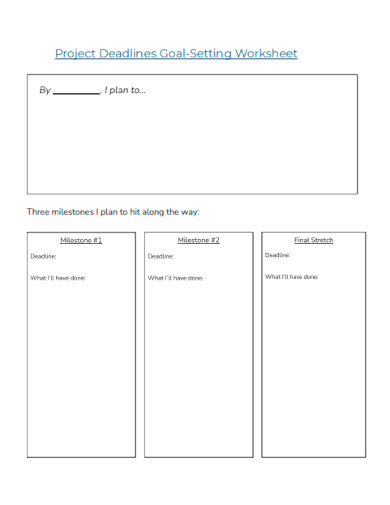
Project Deadlines Goal Setting Worksheet
download now -
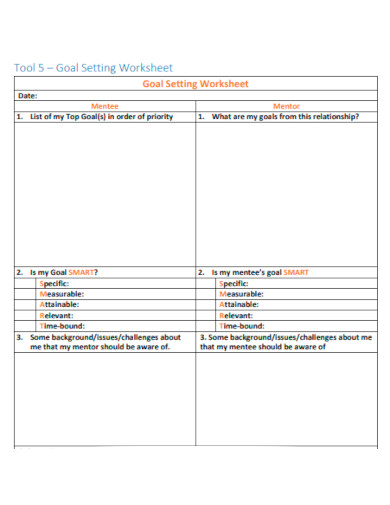
Goal Setting Worksheet Tool
download now -

Goal Setting Worksheet for Couple
download now -
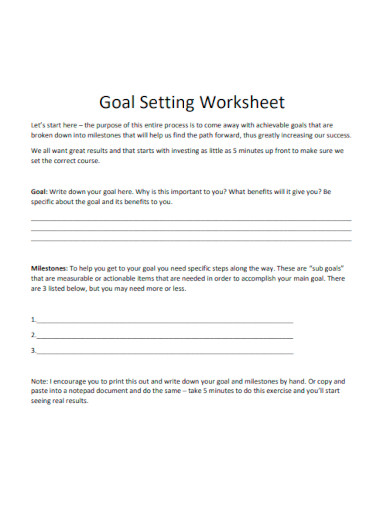
Sample Goal Setting Worksheet
download now -

Project Goal Setting Worksheet
download now -
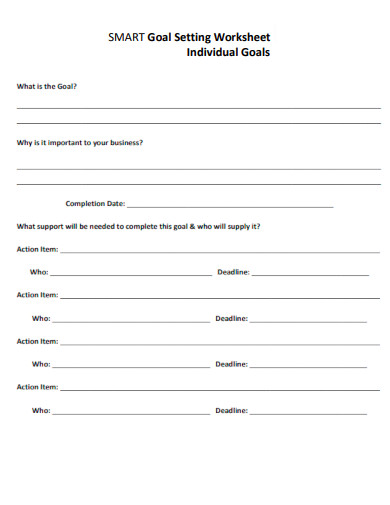
Individual Goal Setting Worksheet
download now -
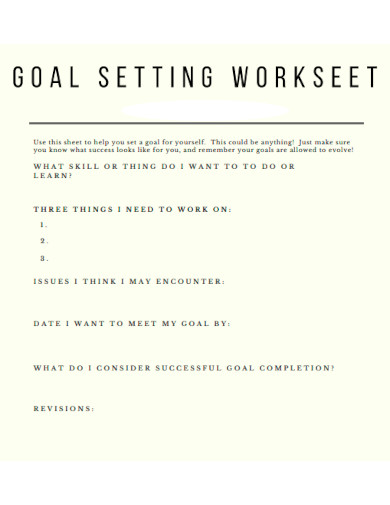
Basic Goal Setting Worksheet
download now -
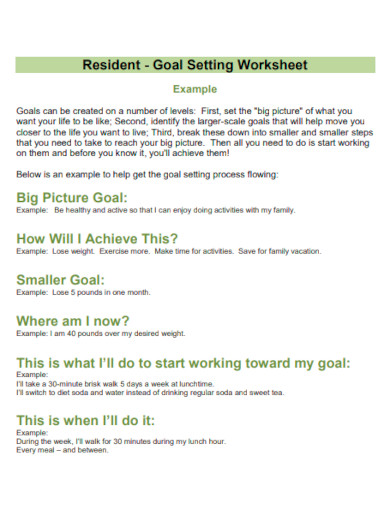
Resident Goal Setting Worksheet
download now -
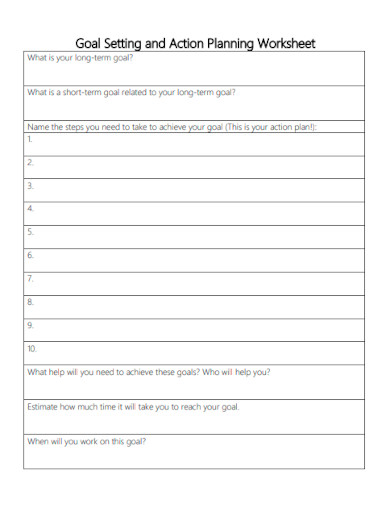
Goal Setting and Action Planning Worksheet
download now -

Student and Supervisor Goal Setting Worksheet
download now -
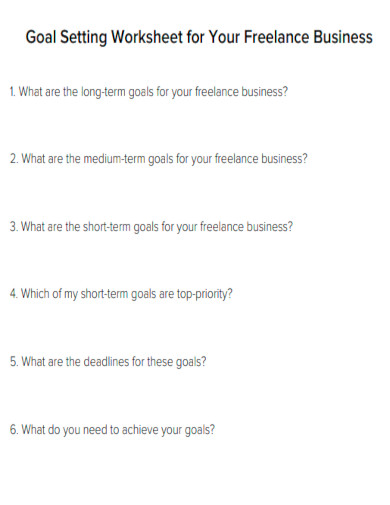
Freelance Business Goal Setting Worksheet
download now -
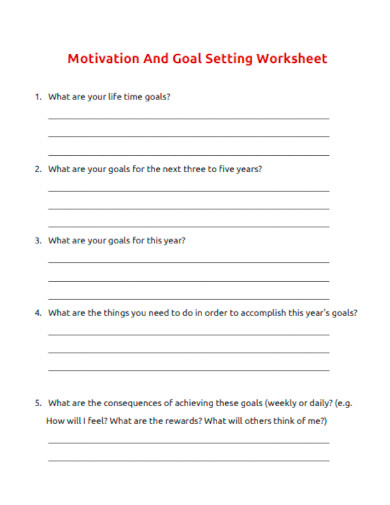
Motivation Goal Setting Worksheet
download now
What Are Goals?
Goals are our decisions and commitments to attain success, break poor habits, adopt good practices, or accomplish more in various areas of life. By assisting us in determining what we want, goals enable us to attain life focus. They maintain our motivation and drive, placing us in a constant state of action. Goals can help us make the most of our only life when properly conceived and pursued. Goals can be applied to various aspects of our existence and can be time-bound. For instance, life-based goals include personal development, career, education, health, family and relationship, and spiritual and social objectives.
Benefits of Goals
Setting goals creates a long-term vision and provides daily measurable objectives to concentrate on. Goals provide the structure for organizing your daily time, energy, and focus. It helps you align your focus with your daily actions, as you have a distinct destination to reach and a plan to get there. Setting goals clarifies what matters and provides a clear path and strategy for pursuing those objectives. People who set objectives are more productive, innovative, self-assured, and less stressed. Goal setting clarifies what you want to achieve in life and a framework for taking focused, effective, and decisive action to achieve those objectives. Understanding the advantages of goal setting enhances your ability to set and achieve objectives.
How to Develop a Method for Establishing Objectives
Setting goals and developing clear plans to attain them is a great way to grow and advance professionally. When you establish and pursue career objectives, you will develop a more robust skill set, increase self-confidence, and produce impressive results for your employer. Create a vision statement for yourself and formulate actionable measures to achieve it. You should sit down and determine both your short- and long-term objectives and the steps you will take to complete them. Follow these methods to establish a precise and efficient goal-setting process:
1. Conduct a Self-Assessment
Specific objectives with measurable measures provide direction. Your dreams should also include specific dates and quantities to gauge your success. Your goal should be attainable to maintain your confidence. However, it should be challenging enough to remain difficult. Setting challenging and achievable objectives will maximize your satisfaction while demonstrating your capabilities to your coworkers. In addition, your dreams should be time-sensitive. This will provide you with a specific deadline for achieving your goals.
2. Write Down Potential Goals
Before beginning the goal-setting process, evaluate your interests, strengths, and areas for improvement. Consider where you’d like to be professionally and personally in the next few years. This assists you in determining your strengths and areas of development. Evaluating your interests can also help you decide which aspects of your personal and professional life spark your enthusiasm. This enables you to establish objectives that propel you toward a happier, more fulfilling existence.
3. Transform These Objectives Into Smart Objectives
After deciding which objectives to pursue, you can transform them into SMART goals. This acronym stands for clever, measurable, achievable, realistic, and time-constrained. Your aim should be specific enough to provide a clear direction for your efforts, as opposed to being general or ambiguous. The more detailed your objective, the simpler it will be to outline the necessary steps to attain it. To make your objective quantifiable, use numbers or dates to more precisely track your progress. Also, the objective should be attainable, meaning it should be challenging and reasonable to achieve. If the objective is possible and does not appear impossible, you are more likely to persist and feel prepared to achieve it. Your career-related objectives should also align with your values, purpose, and passion. Ensure that your short-term goals contribute to your long-term objectives. A time-based target is the deadline you set for achieving the objective. This allows you to hold yourself accountable for achieving your goals and to determine if you are on track and making progress.
4. Create an Action Plan to Achieve These Objectives
Document your final objectives. This makes them seem more tangible and enables you to visualize your goals more clearly. Ensure you’ll remember them by placing them somewhere you’ll frequently see them. This may be a notification on your phone, post-it notes on your workstation, or a computer-based reminder. After writing them down and posting them in a conspicuous location, you can formulate plans to determine how to achieve your objectives. Your action plan can consist of the precise steps to achieve your ultimate objective. By dividing objectives into distinct tasks list and actionable actions, they become more manageable and less intimidating. For instance, if your ultimate objective was to gain more industry connections, one of your steps could be to attend more conferences and seminars or to compose a compelling elevator speech.
5. Establish a Timeline and Deadlines
If you have multiple goals to achieve, it is simpler to create a timeline and organize your objectives accordingly. Planning which goals you’ll complete by specific dates allows you to focus on one at a time rather than being overwhelmed by achieving multiple goals simultaneously. Creating a timeline chart and scheduling duties and objectives for specific dates may be helpful. Creating a timeline and assigning yourself specific deadlines increases your sense of urgency. This motivates and encourages you to complete particular tasks on time and keeps you on track to achieve your objectives.
6. Check-In on Your Progress Regularly
Since other events in life can get in the way of achieving goals, it’s essential to check in frequently to ensure that you’re still on track. Attempt to evaluate your progress often. I suggest scheduling a weekly check-in to assess your progress. If you discover that you need to catch up on your objectives, you can modify your timeline to suit your requirements and your sample schedule better. Adjust them by a reasonable quantity to avoid pushing the dates too far back. If numerous life events cause you to push back deadlines or miss a few, strive to remain optimistic and don’t let this discourage you. Remind yourself that falling behind is acceptable, and push yourself back on track with your objective.
FAQs
How does goal setting improve motivation?
Goals increase motivation by providing tangible results for one’s efforts. Each time you complete one, you will experience a sense of accomplishment, encouraging you to continue. The trick is to structure your objectives appropriately.
What are goals worksheets?
Setting objectives is a time-consuming and challenging process. Nonetheless, a worksheet on goal-setting can simplify the process for you. It acts as a guide, encouraging you to contemplate the objective you’ve set for yourself and to record all the necessary steps, including a timeline.
What are activities in goals?
Objectives are the specific actions required to attain an objective. Objectives are typically precise, measurable and personal statements describing how the goal will be achieved. Activities provide additional information on how the objective will be reached by specifying what will be accomplished within a given time frame.
Setting goals is crucial because it permits you to advance your career by enhancing your skill set. Goals also help you remain on track with self-improvement and give meaning to your personal and professional life. By establishing objectives, you can better comprehend your strengths and areas for improvement. You will feel more confident in your career performance, skills, and abilities as you continue to develop your abilities and accomplish your goals. Are you prepared to construct a worksheet? Try to reread the instructions before you create one!
